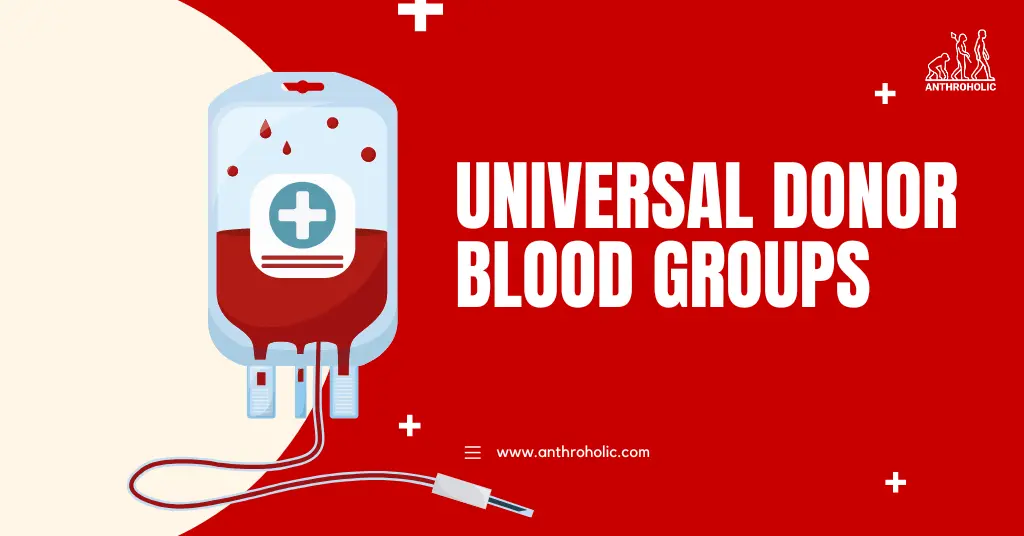AI Answer Evaluation Platform Live Now. Try Free Answer Evaluation Now
Universal Donor Blood Group
Every minute, people across the globe require life-saving blood transfusions for a plethora of reasons – from surgeries and injuries to chronic illnesses. Among the various blood types, one holds a unique and vital role: O negative, the universal donor blood group.

Understanding Blood Groups
Human blood types are determined by two major systems – the ABO system and the Rh system. The ABO system, discovered by Karl Landsteiner, classifies blood into four categories, A, B, AB, and O, based on the presence or absence of specific antigens on red blood cells. The Rh system further characterizes these types as positive or negative [1].
The ABO System
| Blood Type | Antigens on Blood Cells | Antibodies in Plasma |
|---|---|---|
| A | A | B |
| B | B | A |
| AB | A and B | None |
| O | None | A and B |
The Rh System:
- Rh Positive: Indicates the presence of Rh antigens.
- Rh Negative: Denotes the absence of Rh antigens.
O Negative: The Universal Donor
O Negative blood type, unique among others, can be donated to individuals of any other blood type – A, B, AB, or O, irrespective of their Rh factor.
Why O Negative?
The O negative blood group lacks A, B, and Rh antigens on the surface of the cells, reducing the risk of an immune response during a transfusion. Thus, it’s compatible with all other blood types, earning its “universal donor” status [2].
Significance and Usage
- Emergency Situations: In emergencies where there’s no time to determine the patient’s blood type, O negative blood is used.
- Neonatal Care: O negative blood is often used for newborn babies as their blood type might be unknown.
- Scarcity: Despite its critical role, O negative blood is rare. Only about 7% of the population has this blood type.
Importance of Donations from O Negative Individuals
With the scarcity of O negative blood and its vital role in healthcare, it’s essential that O negative individuals consider regular blood donations [2].
Donations: Saving Lives
Donating blood is a simple, safe process. An average adult has about 10 pints of blood, and during a donation, only one pint is collected. The body replenishes this volume within 24 to 48 hours.
Mobilizing O Negative Donors
Efforts must be made to encourage more O negative individuals to donate blood regularly. Awareness campaigns about the significance of this blood type and the life-saving potential of donations can greatly enhance the availability of O negative blood.
The universal donor blood group, O Negative, plays a crucial role in medical procedures and emergencies. While it’s rare, its unique compatibility with all other blood groups underscores the need for regular donations from O negative individuals. Every donation counts, every donation can save a life.
Ensuring Safety in Blood Transfusions
Although O Negative blood can be received by all other blood types, it is always preferred to match the exact blood type for transfusion, wherever possible. This is because other components of blood, such as antibodies and proteins, can still cause reactions.
Crossmatching: An Essential Step
Before a transfusion, a ‘crossmatching’ test is done. This ensures the donor’s blood doesn’t have antibodies that will react with the recipient’s blood. Despite the universal donor ability of O Negative blood, this step is still followed for maximum safety.
The Rh Factor Complication
A minor challenge arises from the Rh factor. Although Rh negative individuals can donate to both Rh negative and positive recipients, Rh negative patients should ideally receive Rh negative blood to prevent potential issues with future transfusions [2].
O Negative: A Blessing in Disguise
People with O Negative blood have a unique capability: their blood can potentially save anyone. This special status also makes them more in demand. Therefore, they should make a habit of donating blood periodically, because in doing so, they are saving lives one pint at a time.
More than Just a Blood Type
Possessing the O negative blood group isn’t just about the universality of blood donation. It’s about embodying an aspect of humanity where each individual has the capacity to play a significant role in someone else’s life.
As we understand more about the universal donor blood group, O Negative, we also uncover the vital importance of regular blood donations. The world is in dire need of these silent heroes who, with every donation, give someone else a chance at life.
References
[1] Storry, J.R., Olsson, M.L. (2009). “The ABO blood group system revisited: A review and update.” Immunohematology, 25(2), 48–59 http://dx.doi.org/10.21307/immunohematology-2019-231
[2] Lee, E., Gill, J., Quraishy, N., & Lin, Y. (2017). “Demographic Characteristics of O Negative Blood Donors: A Retrospective Analysis”, Transfusion, 57(8), 1981-1986 https://doi.org/10.3390%2Fpathogens10121633




